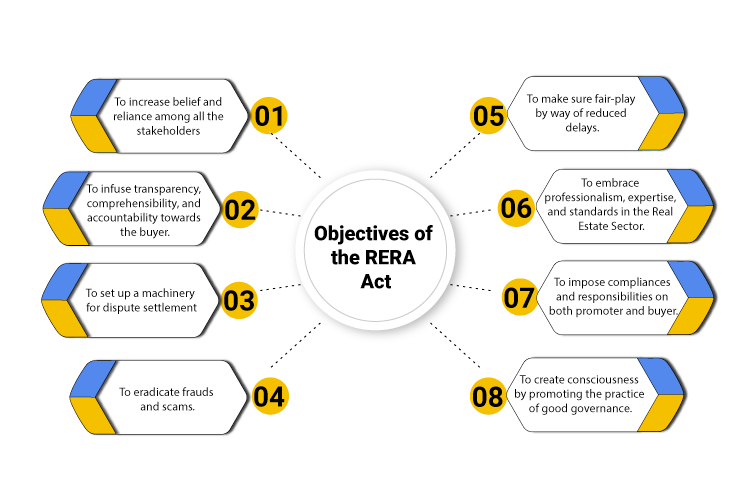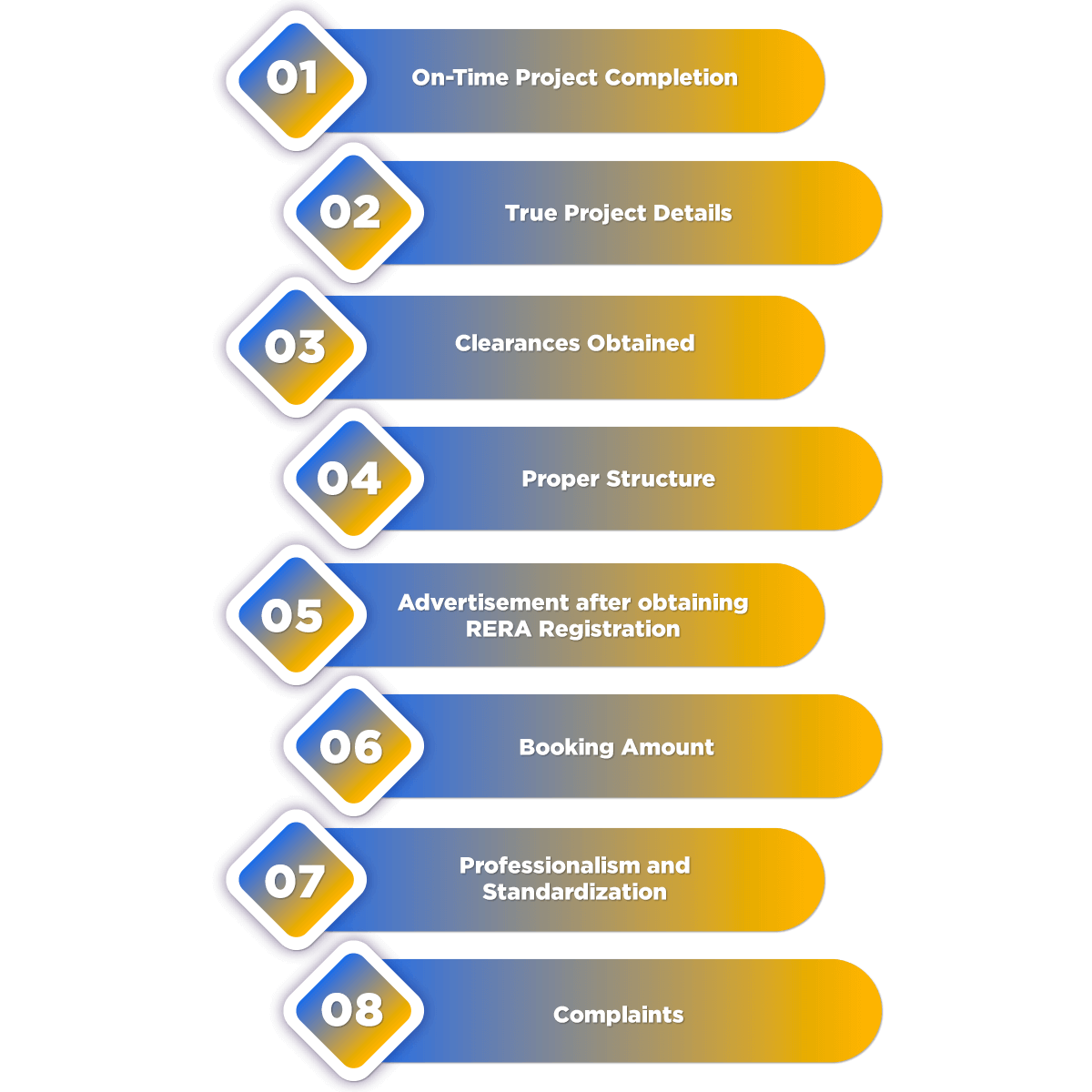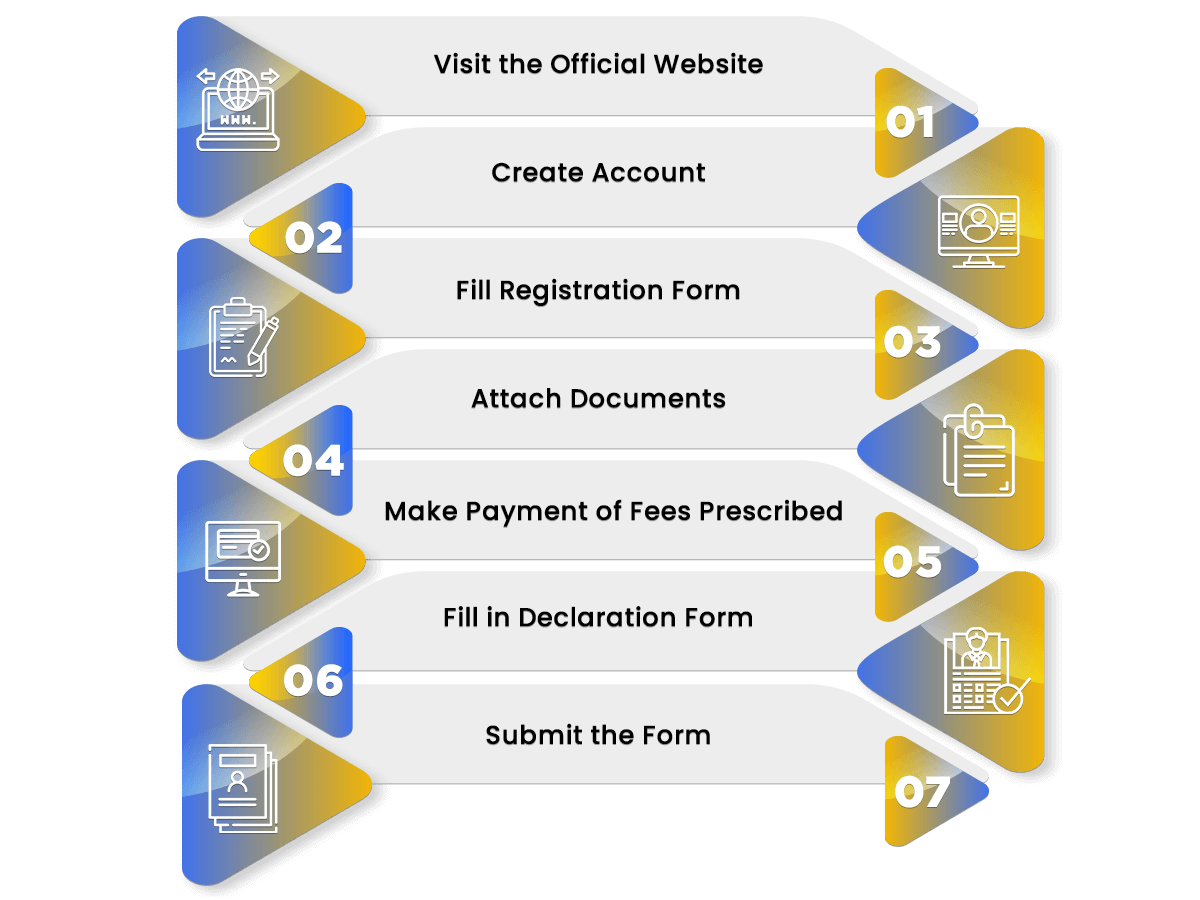Overview of RERA Registration
In India, the Real Estate Sector plays a significant role in satisfying the demands and needs for affordable infrastructure and housing. Hence, this sector acts as a tower of strength for our Indian Economy. It is noteworthy to take into consideration that although this industry has grown-up considerably in recent years. However, prior to RERA 2016, this sector was mainly unregulated, with a lack of professionalism, transparency, standardization, and most importantly consumer protection. Also, there were no sectoral regulator for this sector like SEBI, TRAI, IRDAI, etc.
The Real Estate (Regulation and Development) Act, 2016, (RERA) was enforced on 01 May 2016. The RERA Act was implemented to bring accountability, transparency, and unambiguousness to the real estate sector. Due to this Act, it is now obligatory and compulsory not only for all the Real Estate Projects but also for the Real Estate Intermediaries and Agent to get themselves registered under this act, i.e., obtain RERA Registration.
Indian Real Estate Industry Report by IBEF
As per the recent report issued by the IBEF (Indian Brand Equity Foundation), in the month March 2020, by the end of the year 2040, the Indian Real Estate industry is projected to escalate to US $ 9.30 Billion (Rs 65,000 crores) from US $ 1.72 billion (Rs 12,000 crores) of the year 2019. Besides this, the market size of the Indian Real Estate Sector is anticipated to reach US $ 1 Trillion by the end of 2030 from US $ 120 Billion in the year 2017.
Similarly, by the end of the year 2025, the real estate sector will contribute around 13 percent of the country’s total GDP (Gross Domestic Product). Also, various other real estate sectors such as the retail, commercial, and hospitality are offering the much-required substructure for India's increasing requirements. Lastly, the Indian Real Estate Industry is expected to upsurge by 19.5 percent CAGR (Compound Annual Growth Rate) from the year 2017 to 2028.
Data Released by DPIIT
According to the data released by the DPIIT (Department for Promotion of Industry and Internal Trade Policy), the construction industry is the fourth largest industry in India, in terms of inflow of FDI (Foreign Direct Investment). Also, FDI in the real estate sector including the construction activities and development amounted to US$ 41.53 Billion from the year April 2000 to the end of December 2019.
Why was there a need to RERA in India?
The Real Estate Sector has always played a crucial role in strengthening our Economy both Financially and Industrially by offering affordable infrastructure and housing projects. As a result, the standard of living of our citizens has improved significantly. However, there were a few occurrences that provided a clear picture before the administration with regard to an imperative necessity to implement a law that will particularly deal only with the Indian Real Estate Industry.
These instances include undue delay in the project completion, no sectoral regulators like SEBI, IRDAI, TRAI, etc. However, the most significant was that the consumers of the Real Estate industry prior to the enforcement of RERA Act used to approach the consumer courts under the Consumer Protection Act, 1986, for the grievance redressal, but the said alternative was just curative and not suitable to address all types of concerns that a buyer had. Hence, the Real Estate Act, 2016 was enforced to safeguard the interest of buyers, and to also provide the much-needed impetus or motivation to the sector.
What are the Objectives of the RERA Act?

The following listed are the key objectives of the RERA, 2016:
- To beget belief and reliance among all the stakeholders like, developer, promoter, and buyer.
- To infuse transparency, comprehensibility, and accountability towards the buyer to protect his or her interest.
- To set up a machinery for dispute settlement in order to redress buyers’ grievances.
- To eradicate frauds and scams by increasing compliances.
- To make sure fair-play by way of reduced delays.
- To embrace professionalism, expertise, and standards to lead smooth working in the Real Estate Sector.
- To impose compliances and responsibilities on the promoter as well as on the buyer, in order to carry out transactions smoothly.
- To create consciousness among all the stakeholders by promoting the practice of good governance.
What are the Benefits of RERA Registration?

The benefits or the advantages annexed with the concept of obtaining RERA Registration are listed below:
- On-Time Project Completion
Generally, the developers or the builders have a habit of making false and fabricated commitments about the project’s completion date. However, it has been evidenced that they do not deliver the same on time. As per the RERA 2016, stringent regulations have been levied on the developers and builders. Thus, if in case the developer or the builder does not deliver their project on time, then the developer will have to refund the buyer together with interest.
- True Project Details
Nowadays, builders tend to promote their real estate project by falsely describing the amenities offered and the features of the said project. According to the RERA Act, 2016,the builders are now not allowed to make any modifications in the already prescribed plan. However, if in the case the developer is found guilty of doing modifications or alterations in the project, then he or she will be liable to pay a penalty of 10 percent of the total cost of a project. The same defaulter can even be punished with an imprisonment of up to 3 years.
- Clearances obtained
The developers or the builders must acquire all the required for the developers or the builders to acquire all the required clearances prior to selling flats. The reason behind this is that any delay in obtaining clearance will automatically result in a delay in providing flat to buyer.
- Proper Structure
If in case the purchaser discovers any structural or mechanical defects in the development of the building, then in this case the concerned builder is accountable for repairing the structural deficiency up to five years.
- Advertisement after obtaining RERA Registration
The builder or the developers are not permitted to promote or advertise any of his real estate projects before obtaining RERA Registration. The builder is obligated to acquire RERA Registration from the Real Estate Regulatory Authority, the authority founded under the RERA act. Moreover, it shall be pertinent to note that the provided RERA registration number has to be shown in every advertisement or promotion.
- Booking Amount
The booking amount for the buyer has now been decreased from 20 percent to 10 percent. Moreover, the same is required to be paid only after entering into the “agreement for sale” with the concerned builder. The concerned buyer is then allowed to a 15days’ notice.
- Professionalism and Standardization
Nowadays, the RERA is not only reinforcing the real estate sector but is also assisting it attaining a certain notch of professionalism. Apart from this, the governing act has made it a choice for the people to join the real estate industry.
- Complaints
It shall be noteworthy to take into consideration that not only buyers but also the brokers, promoters, and developers registered under the RERA, 2016 are also authorized to file complaints concerning any issue.
What are the Impacts of the RERA Act?
The listed below are the Key Impacts of the RERA Act on the Real Estate Industries:
- There has been an increment in the Cost of the Project.
- The Cost of Capital has been improved.
- This has led to liquidity in the hands of developers and promoters
- Establishment of the State Real Estate Regulatory Authority, together with the introduction of the Real Estate Appellate Tribunal. The same has been done for the fast settlement of the complaints concerning the property purchase, and has certainly persuaded the real estate industry. Also, such an appellate tribunal not only has the autonomy to hear the appeals but also has the powers at par that of a civil court.
- RERA Registration has established standards and grounds for the fast settlement of the grievances.
What is the Applicability of RERA Registration?
The following listed is the Applicability of RERA Registration:
- This act applies not only to the real estate projects and promoters but also covers the real estate agents.
- Obtaining RERA registration is mandatory for all the residential, commercial, and planned development.
- Earlier, the only requirement for mandatorily obtaining RERA Registration was that if the concerned real estate project is either exceeding 500 Sq. Meters or is having the apartments beyond the count of eight. However, the already prescribed ambit has now been enlarged, and the same covers even the small projects, i.e., the project which is either less than 500 sq. meters or is having up to eight apartments.
- The Real Estate Agents who are involved in the activities of selling and purchasing properties shall mandatorily obtain the certificate of RERA registration. The certificate remains valid all over the State.
- After obtaining successful RERA registration, a UIN (Unique Identification Number), Password, and User Id is generated. The said promoter or developer can use the provided login credentials to log in to its real estate project for updating its details.
What are the Documents needed to obtain RERA Registration?
The details and documents that are required for obtaining RERA Registration of a Promoter Company are as follows:
- Certificate of Registration
- Name of the chairman of the Governing body/ Partners/ Directors
- Address of the chairman of the governing body/ Partners/ Directors
- Date of Company’s Incorporation
- Passport-sized photograph
- Registered Address of the Company
- PAN Card details of the Builder
- Registered Email Id
- A copy of CIN (Company Identification Number)
- A copy of TAN (Tax Deduction Account Number)
- Details of the prior Real Estate Project experience, if in case any
- The Audited Balance Sheet of the previous financial year
- Promoter’s or the Builder’s official website
- Income tax return (ITR) of the previous three financial years
- Details about all the previous real estate projects taken up in the last five years.
- Name of concerned real estate project
- Till date Status (whether Completed or Under Progress)
- Any pending case if yes, then the case name and case number
The details and documents needed for the RERA Registration of a Promoter or Builder as an Individual are as follows:
- Applicant’s Name
- Father’s name
- Occupation
- Passport-sized photograph
- Permanent Address
- A copy of Aadhar card
- A copy of the Audited Balance Sheet for the previous financial year
- Promoter’s official website
- A copy of the ITR (Income Tax Return) of the previous three years
- A copy of the PAN Card
- Builder’s Email Id
- Details of the previous project experience, if in case any
The details and documents needed for the RERA Registration of the Real Estate Agent are as follows:
- Applicant’s Name
- Father’s name
- State
- District
- Tehsil
- Permanent address
- Passport-sized photograph
- A copy of the PAN Card
- Email Id
- Registration fee (in Rs)
- Date of Payment
- PNB (Punjab National Bank) collection date
- Bank Account Details
- DSC (Director Signature Certificate) of directors
What is the Procedure for obtaining RERA Registration?

Nowadays, obtaining RERA registration is an online process and the same can be acquired by visiting the official portal of RERA. However, the same vary from one state to another state. For example, the official Uttar Pradesh RERA portal.
What are the Penalties prescribed under the RERA Act?
If in case the buyer, builder, or the real estate agent fails to abide by any of the prescribed RERA’s rules, then the listed below penalties will be pertinent:
|
Offenses |
Prescribed Penalty |
|
In the case of Promoters |
|
|
Non-registration of the projects |
10 percent of the project’s total estimated cost |
|
Providing untrueand false information |
5 percent of the project’s total estimated cost |
|
Infringement of the prescribed laws |
Imprisonment up to three years, or a fine of 10 percent of the total estimated cost of the concerned property, or even both |
|
In the case of Buyers |
|
|
Non-compliance with the guidelines prescribed by RERA |
Day-to-day penalty up to 5 percent of the estimated cost of the concerned real estate project |
|
Non-compliance with the order or the directions passed by the Real Estate Appellate Tribunal |
Imprisonment up to one year, or 10 percent of the estimated cost of the concerned project, or even both |
|
In the case of Real Estate Agents |
|
|
Non-registration of the projects |
Rs. 10,000 every day up to 5 percent of the total approximate cost of the concerned project |
|
Non-compliance with the guidelines issued by the RERA |
Day-to-day penalty up to 5 percent of the said project’s total estimated value |
|
Non-compliance with the order or the direction passed by the Real Estate Appellate Tribunal |
Imprisonment up to one year, or 10 percent of the said project’s total estimated cost, or even both |
Frequently Asked Questions
The term “RERA” stands for the Real Estate (Regulation and Development) Act, 2016. It acts as the regulatory force for the real estate sector in India. The reason behind the enforcement of this act was to set up a Real Estate Regulatory Authority in each district and state.
Yes, the RERA Act comprises of all types of Real Estate Projects, ranging from residential to commercial projects. Further, the term “Commercial Project” includes shops, offices, shopping complexes, and buildings.
Yes, the provisions of the RERA Act 2016 are applicable to the On-going Projects as well. The term “On-going Project” means the project that has not received COC (Certificate of Completion).
Yes, it is mandatory for all the projects to get themselves registered with the RERA Authority within three months starting from the date of the enforcement of the act.
Yes, it is mandatory for every builder, developer, and promoter to acquire RERA Registration under the RERA Act. The builders who have not acquired RERA Registration will not be able to sell their projects to prospective buyers.
No, a developer cannot leave a real estate project in half-way, as he/she will have to bear the penalties and fines.
In such a case, the Government will allot another RERA Tribunal to hear the said appeal.
No, in any circumstance other than Natural Calamity, RERA registration cannot be extended further for builders. However, in the case of a calamity, the period cannot extend 1 year.
Just like RERA Registration for Promoters, Real Estate Agents also need to pay a fee for RERA Registration. The fee for registration varies from one state to another.
The RERA (Real Estate Regulatory Authority) bill was drafted in the year 2013. However, the same was passed in the upper house (Rajya Sabha) on 10. 03. 2016, and by the lower house (Lok Sabha) on 15. 03. 2016. Further, the RERA act was completely enforced on 01. 05. 2016.
Yes, the RERA Act, 2016, is prevalent in all the Indian states.
No, the RERA Act, 2016, does not cover the purchase and rental agreements, and the agreement in any other form within its ambit.
Yes, the revocation of RERA Registration is possible in case a complaint is filed against the developer or builder with the RERA Authority. Moreover, the revocation of RERA Registration is also possible when either developer or promoter does not properly adhere to the provisions of the RERA Act 2016 or the guidelines issued by the RERA Authority.
The objectives of RERA Act 2016 include setting up of RERA Authority; promoting genuineness, accountability, and efficacy in the sales of real estate projects; protection and safeguarding of the consumers rights; establishing adjudging machinery for the speedy dispute settlement; and establishing Real Estate Appellate Tribunal to hear appeals.
All the real estate projects which are having a land area of more than 500 sq. meters, or is having more than 8 apartments need to obtain RERA registration on a mandatory basis.
Yes, Swarit Advisors is a 100% online platform that renders services all over the nation no matter where the individual is conducting his/her business. The only thing needed is a proper internet connection on mobile or laptop, and we are all set to get your registration done.
We have completed RERA registration in Delhi, Mumbai, Gurgaon, Bangalore, Noida, Chennai, Ahmedabad, Hyderabad, Kolkata, Pune, Surat, Lucknow, Jaipur, Kanpur, Nagpur, and other Indian cities.
No, there is no need for an individual to be present at our office as the entire procedure of RERA registration is 100% online. The only thing needed is a scanned copy of all the documents sent by way of mail.
No, as per the provision of the RERA Act 2016, every phase is recognised as a standalone real estate project. That means the builder needs to obtain separate RERA Registration for each phase.
If in case a real estate agent violates the provisions prescribed under the RERA Act 2016, he/she will be liable to pay the penalty for everyday of the violation caused. The sum of the same can increase up to 5% of the unit’s total estimated cost.


